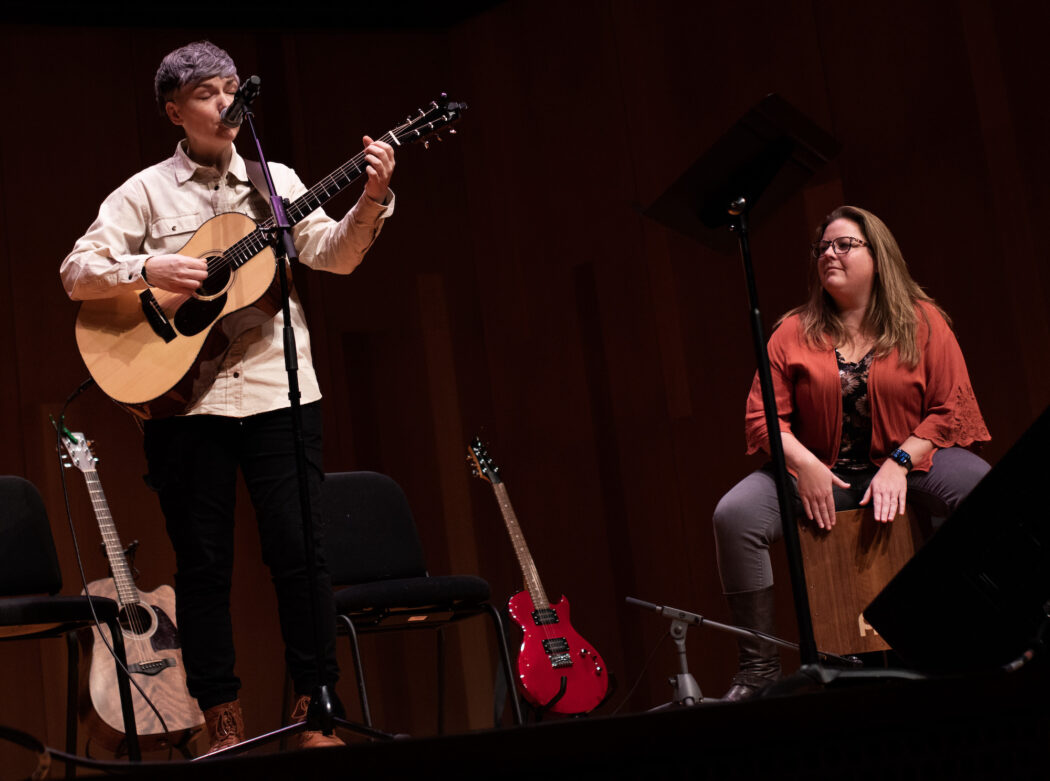Music Therapy students express their creativity in songwriting showcase
On Saturday, April 1, in the greenroom for the Russell Wanlass Performance Hall on Utah State University’s campus, music therapy students and their songwriting mentors prepared their instruments and voices before they went on stage for their songwriting showcase that took place at 7:30 p.m. that evening.
Under the leadership of assistant professor Allison Fox, nine music therapy students had the opportunity throughout the spring semester to work with one of three songwriting mentors to improve their skills.
The three mentors were local songwriter Megan Simper, board-certified music therapist Shannon Kiley and Kate Callahan, a singer-songwriter from Connecticut.
“There have been some music therapy students who are wanting to do a deeper dive into songwriting specifically. They put in an application and were selected,” Simper said.
USU’s music therapy program is part of the music department within the Caine College of the Arts and is the state’s only music therapy program.
Madison Ware, a junior in the program, was one of the students who had the opportunity to participate in this songwriting mentorship. She performed her song “Stained Glass” at the showcase Saturday night.
“Music therapy is the practice of incorporating music into psychological care,” Ware said. “And the music therapy program is all about getting the next generation of music therapists out there to help people who are attuned to music.”
During her performance, Ware played piano and sang, accompanied by fellow music therapy students Silvia Riddell on the violin and Savannah Erekson on the cello.
A variety of instruments and performance styles were used and demonstrated during the showcase. Riddell performed her own song, “Spherical Motion,” on an electric violin using a looper pedal to layer the different parts of the music.
And it wasn’t only the student mentees who performed their original songs. Each of the three mentors performed a song of their own as well.
The mentorship allowed students to grow and learn how to work with someone else while songwriting.
Tori Smith, a senior in the program, is another one of the songwriting mentees.
“It’s really cool to bring an idea, or something that’s not finalized and not completely fleshed out, and say, ‘Here are the things I have,’ and get feedback,” Smith said. “It’s nice because usually my songwriting process has been by myself. So, it’s great to bounce ideas off of people and get insight when you wouldn’t be able to have that insight if you were by yourself.”
The song Smith performed at the showcase is titled “Manic Pixie Dream Girl” and is based on her own experience with the trope often found in media.
“I recognize that trope in myself, as well as how the concept of it is problematic in general,” Smith said. “Basically, the song is about my experience. It’s from the perspective of a manic pixie dream girl and where I found myself in that type of role.”
It was common for the mentees, including Smith and Ware, to write their songs based on their own personal experiences.
Ware said “Stained Glass” is about self-love and self-acceptance.
“It’s about all the concepts of taking what’s broken in you and putting it into a window and letting the light shine into it to call it art,” Ware said. “And it’s following the relationship between this one woman to another guy and asking, ‘Can you see my stained glass and can you love it enough to hold it up to the light as well and say this is art?’”
This experience wasn’t only positive and beneficial for the student mentees but also for their mentors.
Simper said it was beautiful to watch the students stretch themselves and get out of their comfort zone as they are guided by their own individual passions.
“It’s been so great to watch the songs come together and to help to guide them and provide suggestions for various aspects of the songwriting process,” Kiley said. “It’s always healing and validating to be able to share a skill you’ve spent so much time and energy building and be able to help somebody else.”

